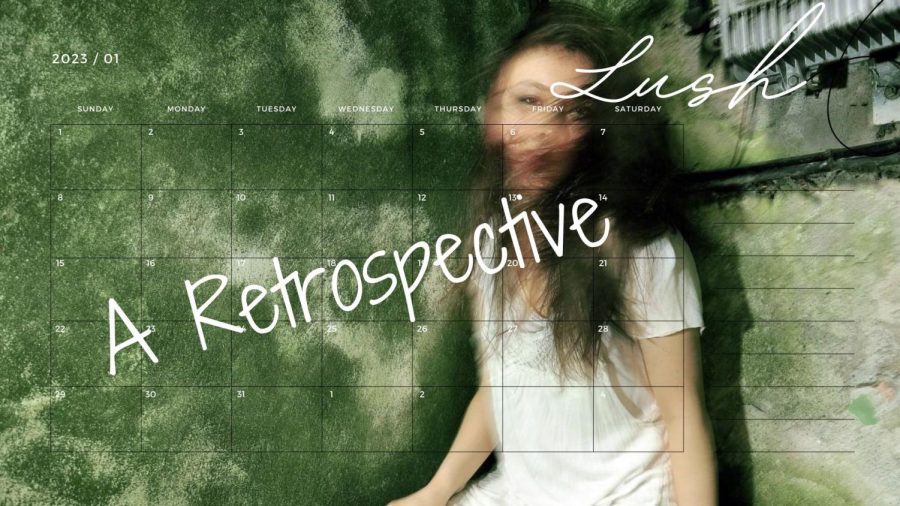“Lush”: A retrospective
Mitski Miyawaki, edited on Canva by Zioni Moore
Birthed from the remnants of Mitski Miyawaki’s junior project for Purchase College Conservatory of Music, the 2012 debut album “Lush” stands as her unappreciated magnum opus. With the album serving as her best in terms of lyrical and technical diversity, there comes a great shame from her later works garnering the bulk of the credit for musical genius.
March 13, 2023
The debut release from indie artist Mitski Miyawaki— known as Mitski—embodies the vast and extensively complex emotions around elegance, rage and a desperate need for the two in a patriarchal society. Lush, a word with origins within the concepts of jezebels, sirens and the expansiveness of what high society can bring to one’s life, became synonymous with the trials and tribulations of trying to achieve these aspirations.
“I spent all my teenage years being obsessed with beauty, and I’m very resentful about it and I’m very angry…I had so much intelligence and energy and drive, and instead of using that to study more, or instead of pursuing something or going out and learning about or changing the world, I directed all that fire inward and burnt myself up,” Mitski said.
Born to a white father and a Japanese mother, Mitski spent her life in a world filled with incredible juxtaposition. Moving across the globe for her father’s job in the US State Department, foundational pieces of her life came to exist. Her form of coping, the arts, drove her to initially enroll in college for film. However, she evolved, changing her major to studio production.
Recording with her tiny mic in her dorm room, Mitski released “Lush”, and it blew the entire indie genre by its feet. The lyricism within “Lush”, as melodramatic, angst-ridden and painfully raw as it stood at the time, deserves analysis far beyond the surface.
The opening track, “Liquid Smooth” serves as a perfect example. “I’m beautiful, I know ’cause it’s the season/ But what am I to do with all this beauty? Biology, I am an organism, I’m chemical/ That’s all, that is all” establishes a surgeon’s precise ability to break down the fallacies within a patriarchal world, particularly with women’s roles as an extension of men, rather than recognizing their individualistic nature. Gentle, yet catastrophic. The chorus to her opener hammers down this point, highlighting the agony of living through the male gaze with her haunting vocals.
This initial release contrasts greatly with her previous works because of an extremely easy reason: her age. Young, in her twenties as a matter-of-fact, and outrageously frustrated at the bubble society has placed her in. To say Mitski despised the unbridled need to stay youthful, nimble and docile would serve as a massive understatement.
With a decade under her belt, however, her almost teenage levels of frustration and angst left with the death of her desperate need to hold on to her youth. In 2019, she officially retired from producing music. Although she still continued to work on scores for movies, she began to value her peace and private life by leaving social media and refraining from extensive interviews. Even through her latest release, “Laurel Hell”, the divine feminine rage ceased to exist, only leaving audiences with pieces of the uncomfortable transition to adulthood. Nevertheless, her first release still remains deeply relatable to the bulk of her audience, which ranges from years 14 to 24. NC students, in particular, still hold her older work in high regard, recognizing the complex feelings that Mitski did and continues to eloquently describe through all her works.
“I think ‘Lush’ is a beautifully haunting album that delivers raw emotions that deliver the female experience. especially with songs such as “Brand New City” where she delivers the line “And if I gave up on being pretty I wouldn’t know how to be alive.” And “Wife” where she sings “cannot bear you a son, but I will try”. An overall amazing album, even though Mitski herself is not the biggest fan of it as it was her very first album… I love that genre and the artists under it, it shows true emotion and feelings but I feel that the sad girl indie rock holds a bad reputation, as Mitski has denounced the genre, saying “Let’s retire the sad girl shtick. You’re more than that,” sophomore Olivia Gonzalez-Langhorne said.





